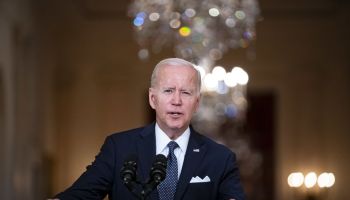Even if NPR loses its federal funding, conservatives will still attack it for bias.
By David Weigel
This is the good argument for slashing the CPB’s funding. The lousy argument is that cutting the funding would save NPR, at long last, from its wretched existence as a Republican punching bag. BREAKING, as they say in the news business: NPR is always going to be a Republican punching bag. The main claim is its liberal bias, not its funding source.
NPR is eternally apologizing for its liberal image, and it does so because it gets government funding. But would that change if the source of NPR’s funding changed? No matter how NPR survives (and it’s going to, even if DeMint takes power in a coup tomorrow), it will owe some donor something. Its donors will be subject to public pressure. There will be critics who will attempt—and succeed—to discredit what it reports because of who funds it.
How do I know this? I’ve worked for nonprofit media and for-profit media since 2004. From 2006 to 2008 I worked at Reason, operated by the non-profit Reason Foundation. From 2009 through early 2010 I worked at the now-defunct Washington Independent, operated by the nonprofit Center for Independent Media.
They didn’t take money from taxpayers. They just used the generous provisions of nonprofit status to get exemption from the corporate income tax, and they got donations that were brought up as shibboleths by anyone irritated by the content. CIM got a grant from George Soros’s Open Society Institute, to fund immigration reporting—the organization and its member sites are constantly labeled “Soros-funded.” The billionaire industrialist David Koch is on the board of trustees of Reason, so that was used by hardcore libertarians (through 2008 or so) and liberals (starting in 2010) to discredit everything it published.
We can’t afford it and they don’t need it,” said Sen. Jim DeMint Wednesday, referring to the $422 million the Corporation for Public Broadcasting gets from the federal government. “We’re facing a $1.5 trillion deficit and spending hundreds of millions on public broadcasting makes no sense today when they are raising millions from private donors and Americans already have thousands of media choices.”
This is the good argument for slashing the CPB’s funding. The lousy argument is that cutting the funding would save NPR, at long last, from its wretched existence as a Republican punching bag. BREAKING, as they say in the news business: NPR is always going to be a Republican punching bag. The main claim is its liberal bias, not its funding source.
NPR is eternally apologizing for its liberal image, and it does so because it gets government funding. But would that change if the source of NPR’s funding changed? No matter how NPR survives (and it’s going to, even if DeMint takes power in a coup tomorrow), it will owe some donor something. Its donors will be subject to public pressure. There will be critics who will attempt—and succeed—to discredit what it reports because of who funds it.
How do I know this? I’ve worked for nonprofit media and for-profit media since 2004. From 2006 to 2008 I worked at Reason, operated by the non-profit Reason Foundation. From 2009 through early 2010 I worked at the now-defunct Washington Independent, operated by the nonprofit Center for Independent Media.
They didn’t take money from taxpayers. They just used the generous provisions of nonprofit status to get exemption from the corporate income tax, and they got donations that were brought up as shibboleths by anyone irritated by the content. CIM got a grant from George Soros’s Open Society Institute, to fund immigration reporting—the organization and its member sites are constantly labeled “Soros-funded.” The billionaire industrialist David Koch is on the board of trustees of Reason, so that was used by hardcore libertarians (through 2008 or so) and liberals (starting in 2010) to discredit everything it published.
I’m harping on the nonprofit side of this because that’s the model NPR and the CPB are likely to stick with even if they lose federal funds. If the argument for cutting federal funds is that nonlisteners and people who don’t support their reporting shouldn’t have to buy in, there’s a problem: Even if they no longer get federal subsidies, they still benefit from some federal tax exemptions. Some of their reporting will come with strings attached by donors who want to endow certain projects. That’s true with a lot of funding to nonprofits that do journalism. It’s attackable.
Story Complimetns Of Slate.com
















